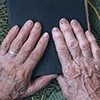Igaz, hogy az idősebbek vallásosabbak?
A vallásosság életúton belüli változása
DOI:
https://doi.org/10.18030/socio.hu.2020.1.25Kulcsszavak:
vallási változás, vallási szocializáció, szekularizáció, élettörténeti interjúAbsztrakt
A vallásszociológiában több szerző megállapítása szerint a vallásosság az egyéni életúton belül többnyire állandó, ezért a szekularizációt inkább generációs hatás eredményének tekinthetjük Nyugat-Európában (pl. Inglehart–Welzel 2005, Crockett–Voas 2006, Voas–Doebler 2011). Magyarországon ugyanakkor a tradicionális, egyházias típusú (az egyház tanítása szerinti) vallásosság csökkenése mellett az individuális jellegű vallásgyakorlási formák az ezredfordulót követően fokozatosan jellemzőbbé váltak az ifjúság körében. Feltételezhető, hogy az utóbbi esetben biográfiai jellegű változásról is szó van. Felmerül a kérdés, hogy napjainkban miként hat a magyar családok tagjai esetében a vallásosság egyéni életúton belüli változására a családban megfigyelhető vallási mintázat, az aktuális társadalmi környezet és a társadalmi kultúra. Tanulmányunkban a következő kérdésekre keresünk választ: (1) Mely faktorok hatnak az egyén vallásosságára az elsődleges szocializációs közegen túl? (2) A valláshoz való közeledés, vagy az attól való eltávolodás hogyan hat az egyén értékrendjének és általában a világnézetének alakulására? (3) A vallásosság életúton belüli változása a vallásgyakorlás mely szféráját mennyire érinti (formális vallásgyakorlás, vallási önmeghatározás, személyes hitélet)? A tanulmányban egy magyarországi kvalitatív adatgyűjtés alapján elemezzük a vallásosság életúton belüli változásának háttértényezőit és hatásait, melynek során 36 élettörténeti interjút készítettünk 2017 nyarán. Olyan családok különböző nemzedékhez tartozó tagjait kerestünk meg, ahol három generáció tagjai megtalálhatóak, így alakult ki a 12 családból álló minta.






